17 Medical Records Clerk Resume Examples
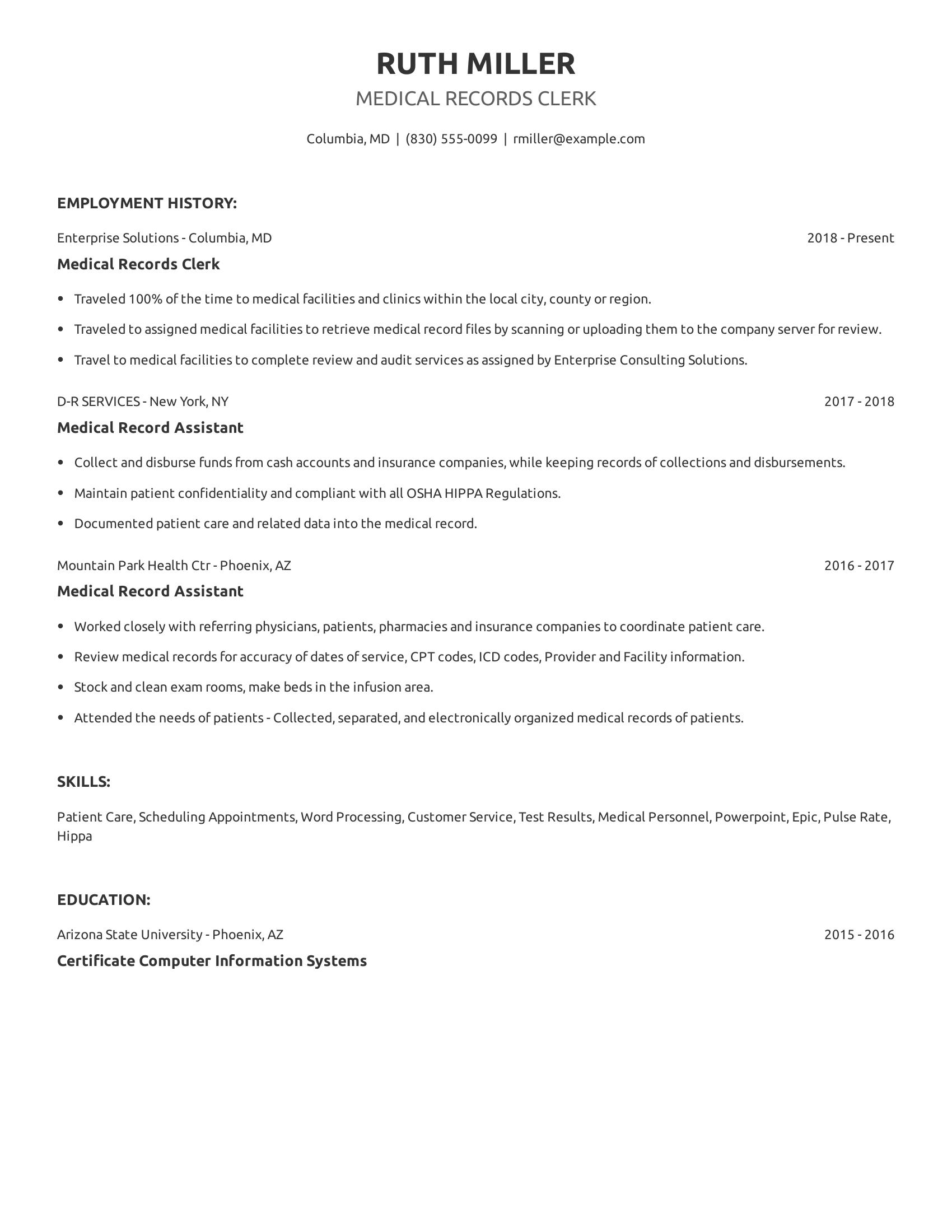



Medical records clerk resumes should highlight experience in handling medical records, knowledge of healthcare regulations like HIPAA, and proficiency with electronic health record systems. It should demonstrate the ability to travel for work, excellent organizational skills, and experience in patient care coordination. Skills in data entry, maintaining confidentiality, and working with various healthcare professionals are also important. Educational background relevant to the healthcare field is beneficial.
This resume includes specific job roles such as traveling to medical facilities to retrieve and audit medical records, maintaining patient confidentiality, and documenting patient care data. It shows experience working with different healthcare providers and insurance companies. Skills listed include patient care, scheduling appointments, and proficiency with software like Epic and Powerpoint. The educational section mentions a certificate in computer information systems, which supports technical skills required for the role.

Medical records technician resumes should focus on relevant skills, such as knowledge of health information systems, patient care, and medical terminology. They should highlight experience in managing medical records, interfacing with insurance companies, and performing administrative duties. Including employment history with specific responsibilities and achievements gives a clear picture of the candidate's background. Education details are also important, especially any certifications or specialized training.
This resume includes strong points like a detailed employment history showing progression in related roles. It lists essential skills such as treatment plans, diagnostic procedures, and patient accounts. The responsibilities and achievements for each job are well-defined, demonstrating the candidate's hands-on experience in managing medical records and supporting medical office operations. The resume also notes interactions with insurance companies and maintaining confidential client files, which are important aspects of the role.
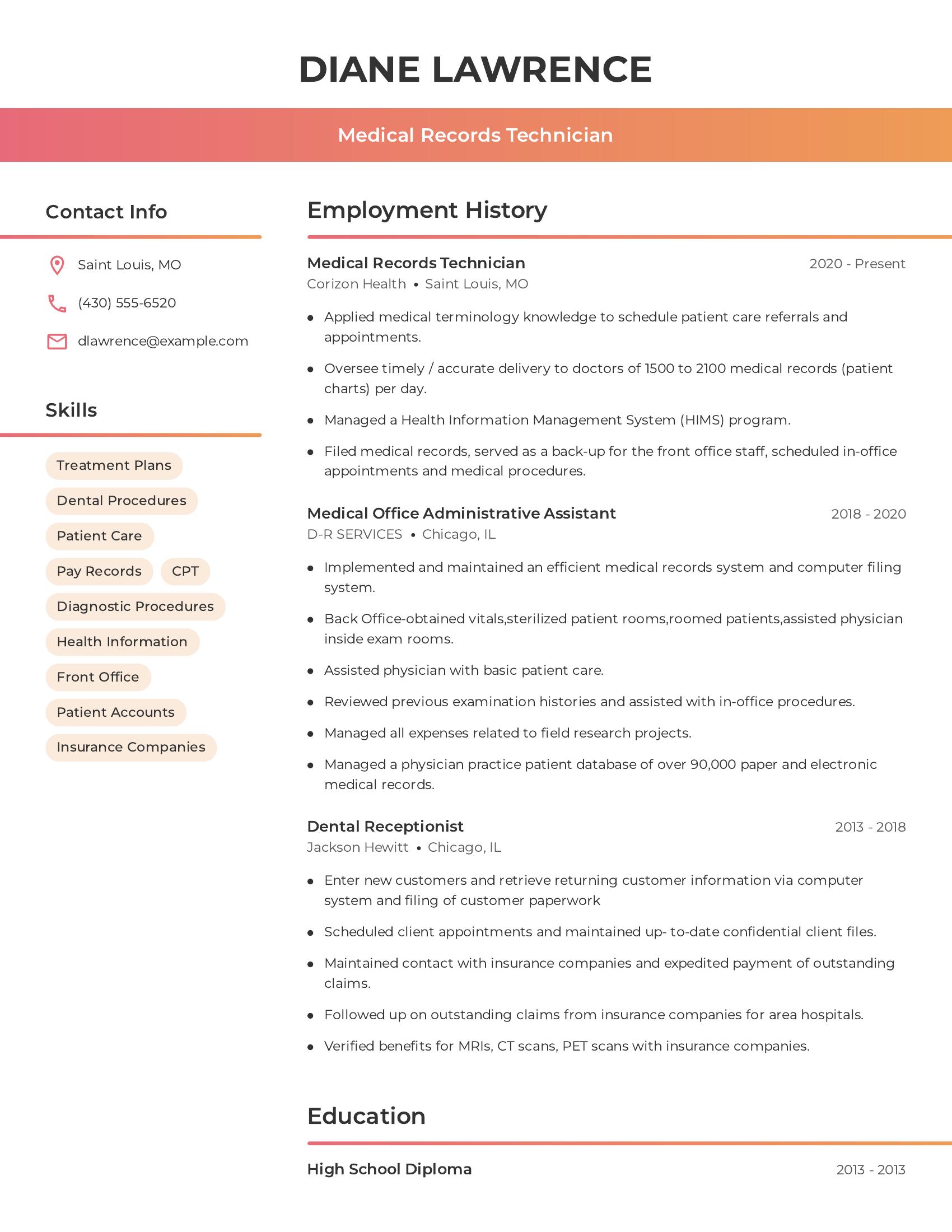
A good medical record assistant resume should highlight experience in managing patient records, data entry, and supporting healthcare professionals. It should include specific tasks like scheduling appointments, handling medical records, and performing basic clinical duties such as venipuncture and EKGs. The resume should also demonstrate familiarity with electronic medical records (EMR) systems and ability to handle confidential information.
This resume includes those specifics by detailing roles in assisting physicians with patient care, performing venipuncture, and managing EMR. It shows a history of scheduling appointments, handling multiple phone lines, and performing clinical tasks. Additionally, it highlights proficiency in data entry and maintaining accurate patient records.
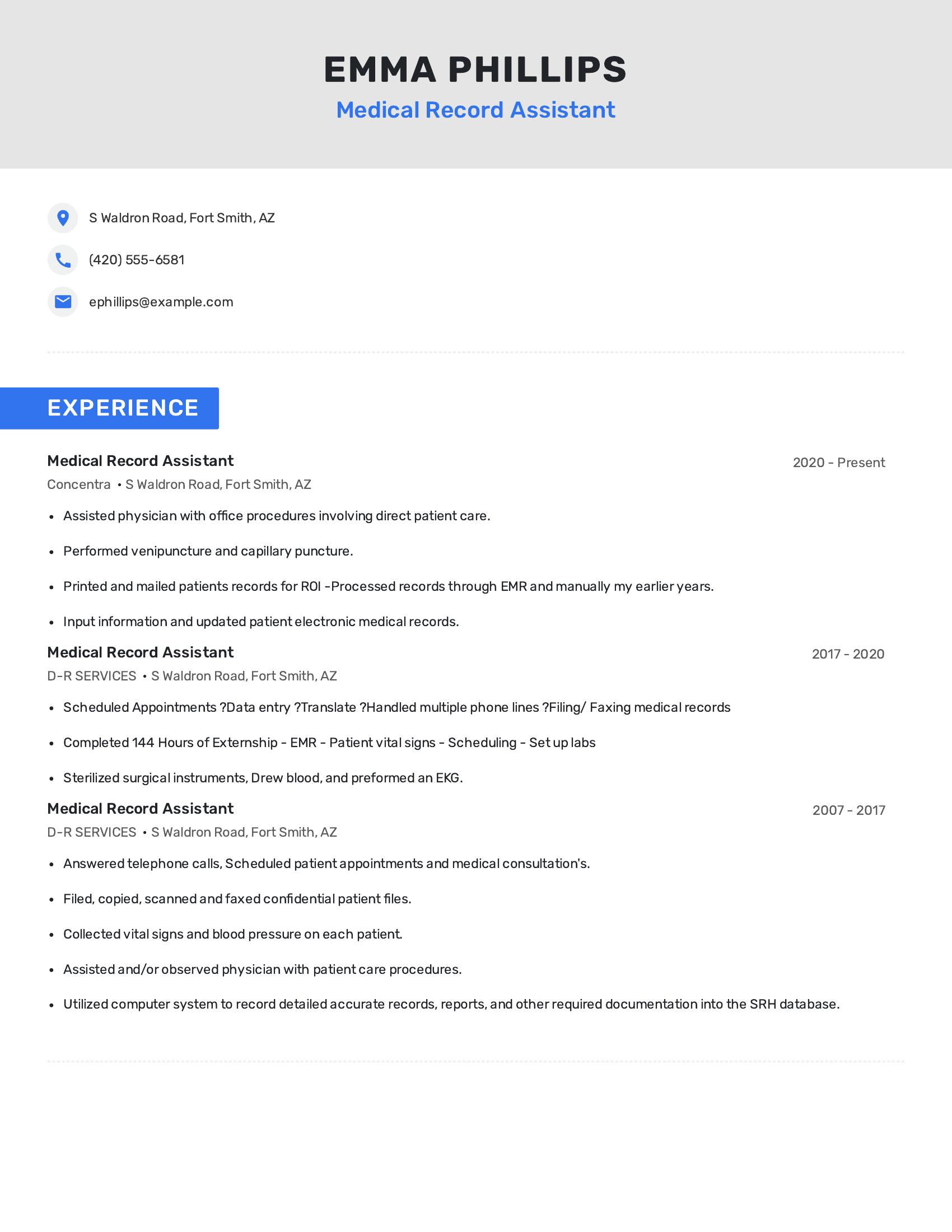
Medical records receptionist resumes should highlight experience with handling medical records, customer service, and administrative tasks. Important components include job titles, duties performed, and relevant skills like managing confidential information, greeting visitors, and using office equipment. The resume should also list educational background and any certifications if applicable.
This resume includes relevant job experiences such as faxing and scanning legal documents, assigning purchase order numbers, and handling confidential information. It also shows versatility with roles in other customer-facing jobs, emphasizing skills like greeting customers and resolving complaints. The skills section lists relevant abilities like handling billing records and medical records, providing a comprehensive view of the candidate's capabilities.
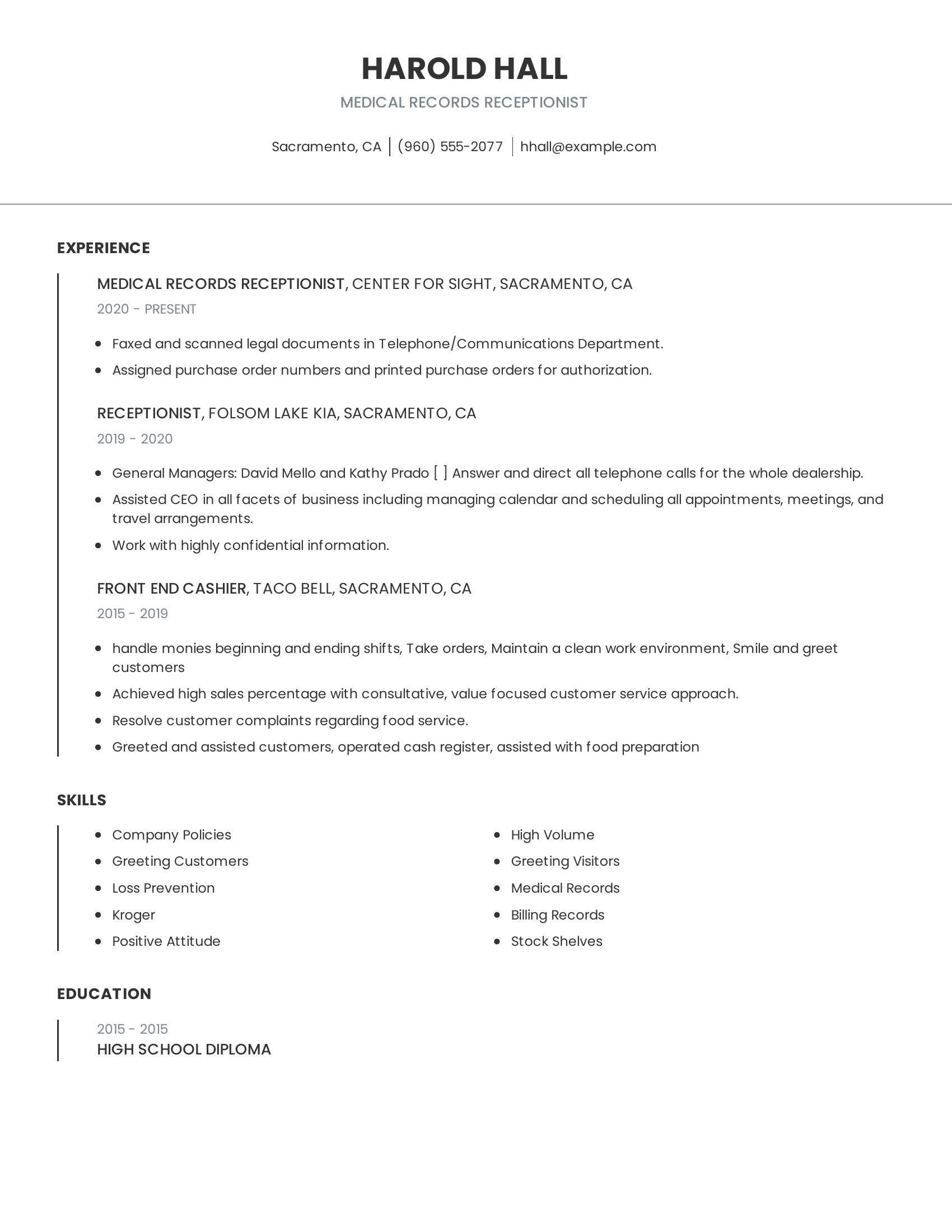
Medical records custodian resumes should highlight experience in managing medical records, familiarity with medical terminology, and proficiency in relevant software. They should also show the ability to handle administrative tasks such as filing, answering phones, and assisting management. A good resume includes clear job titles, dates of employment, and specific duties performed. It showcases skills like customer service, scheduling appointments, and handling patient payments.
This resume includes these specifics by listing job titles like medical records custodian and office receptionist. It details responsibilities such as filing medical records, posting charges, and answering phones. The resume also covers skills in customer service, scheduling, and using computer programs. This demonstrates a well-rounded ability to manage both medical records and administrative tasks effectively.
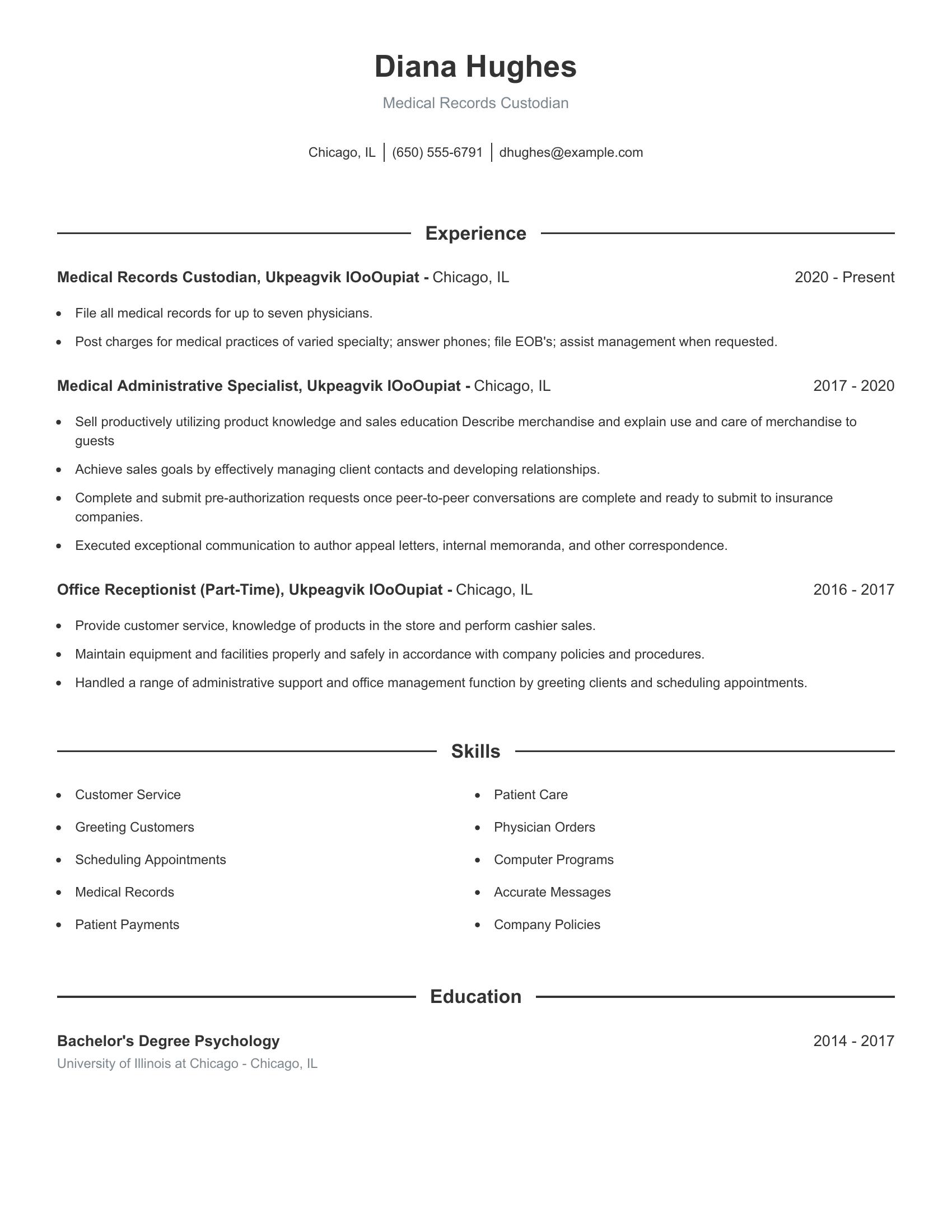
Medical clerk resumes should include specific skills, relevant experience, and education. Key skills might be patient care, medical records management, and proficiency with insurance paperwork. Experience should reflect roles in medical settings with responsibilities like handling patient check-ins and maintaining records. Listing education related to healthcare or business is also beneficial.
This resume includes all these specifics. It lists skills such as patient care and customer service. The employment history shows experience in various medical roles, detailing tasks like coding invoices and transcribing medical records. The education section mentions relevant college courses in business, enhancing the candidate's qualifications for clerical duties.
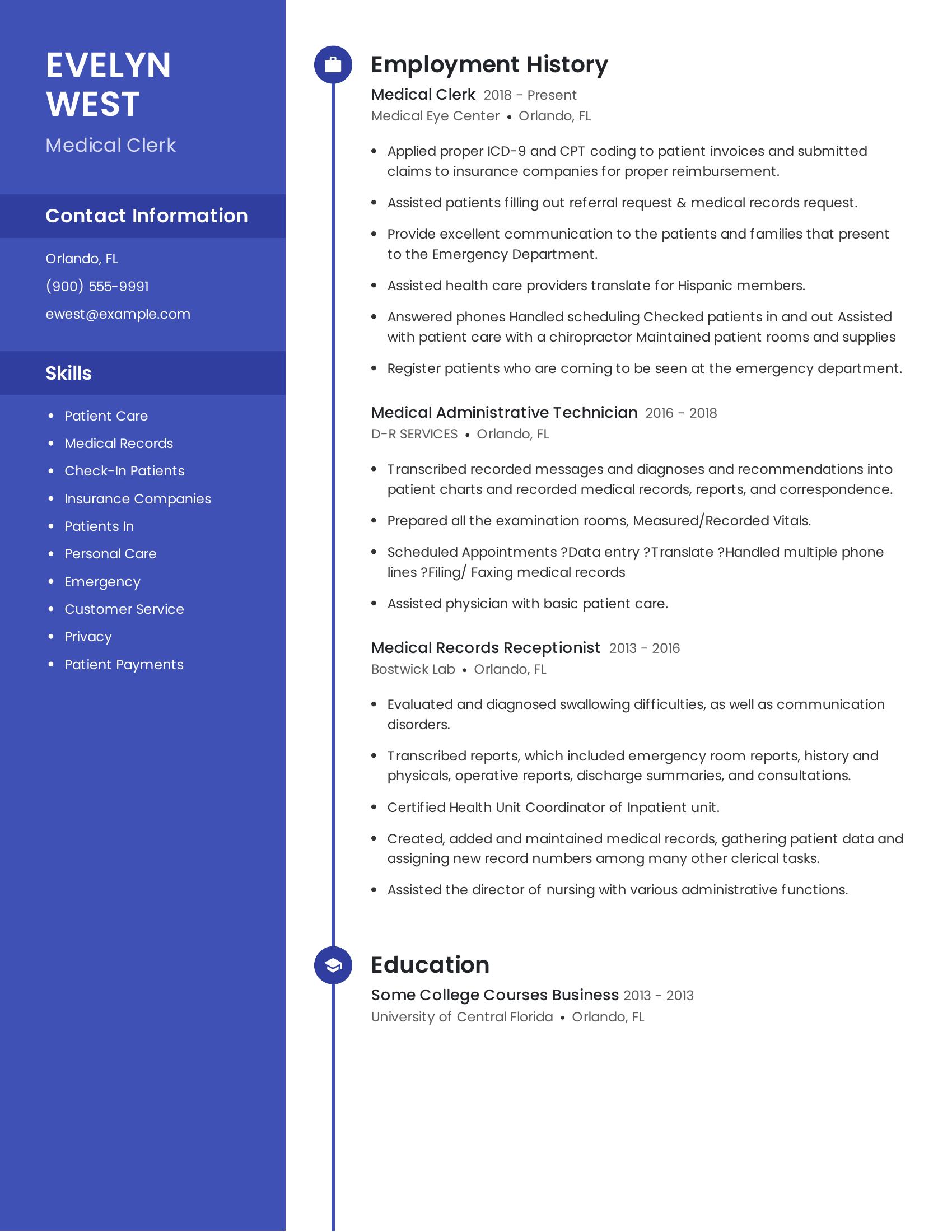
Medical records supervisor resumes should highlight experience in managing medical records, developing policies, and training staff. They should also show familiarity with a range of medical documents and demonstrate the ability to evaluate patient care needs. Including past roles in related fields can display a well-rounded background. Skills in ICD-9-CM, word processing, and communication are also important.
This resume effectively showcases relevant experience in developing policies, training employees, and maintaining patient care flow. It includes various positions that demonstrate a strong background in medical records management and clerical functions. The listed skills align well with the requirements of a medical records supervisor role.
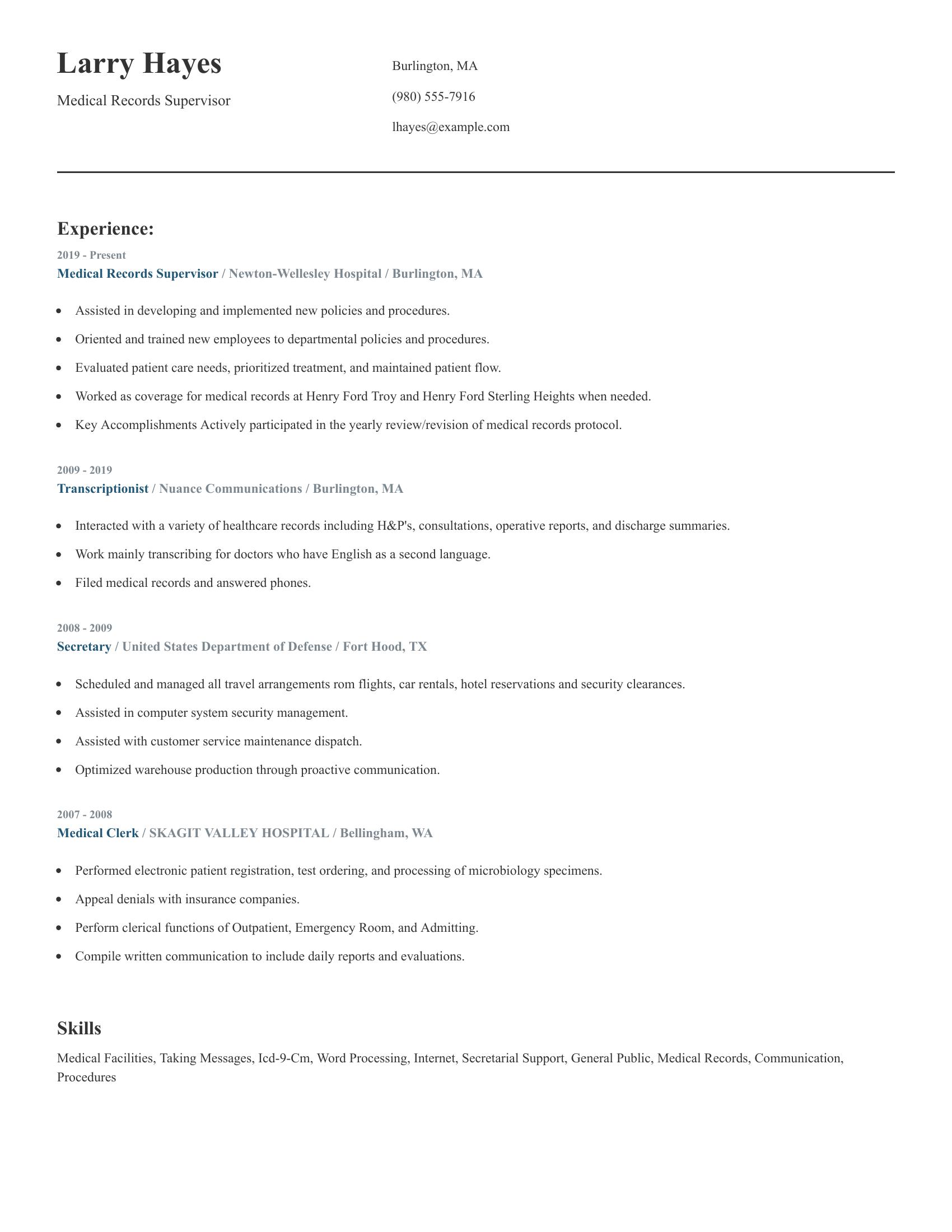
Record filing clerk resumes should highlight experience with managing and organizing records, proficiency in using electronic health records, and skills in handling general office tasks. Key components include a clear employment history that shows hands-on experience in relevant roles, specific skills related to record management, and any additional duties performed that demonstrate versatility. Showing progression in responsibilities and including education background is also important.
This resume effectively includes these specifics by detailing the candidate's employment history in roles closely related to record filing and office management. It lists relevant skills such as handling legal documents, patient care, and accurate records. The resume also provides a clear timeline of employment, showcasing experience with electronic health records and supervisory roles. Education is briefly mentioned, which complements the work experience listed.
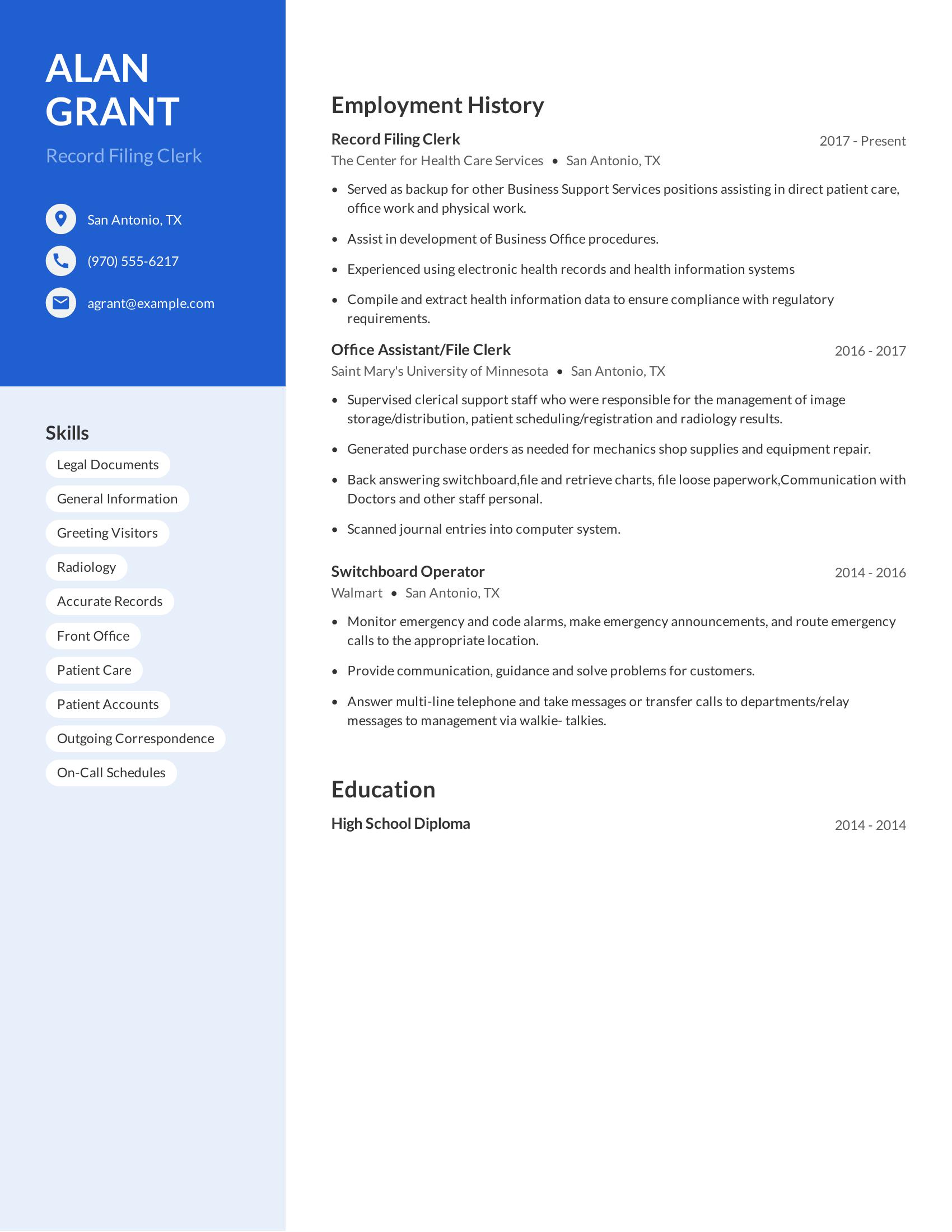
Medical office administrator resumes should highlight experience in managing medical records, handling insurance claims, and performing front-desk duties. They should include details of specific systems or software used, such as EHR or ICD-10 coding, and demonstrate proficiency in customer service and administrative tasks. Skills related to patient care, scheduling appointments, and maintaining compliance with regulations like HIPAA are also important.
This resume includes relevant experience such as implementing an Optical Imaging System for medical records and participating in quality assessment activities. It shows a history of handling insurance authorizations, maintaining electronic medical records, and resolving customer issues. Skills listed include SAS, patient care, EKG, and scheduling appointments, which are valuable for the role.
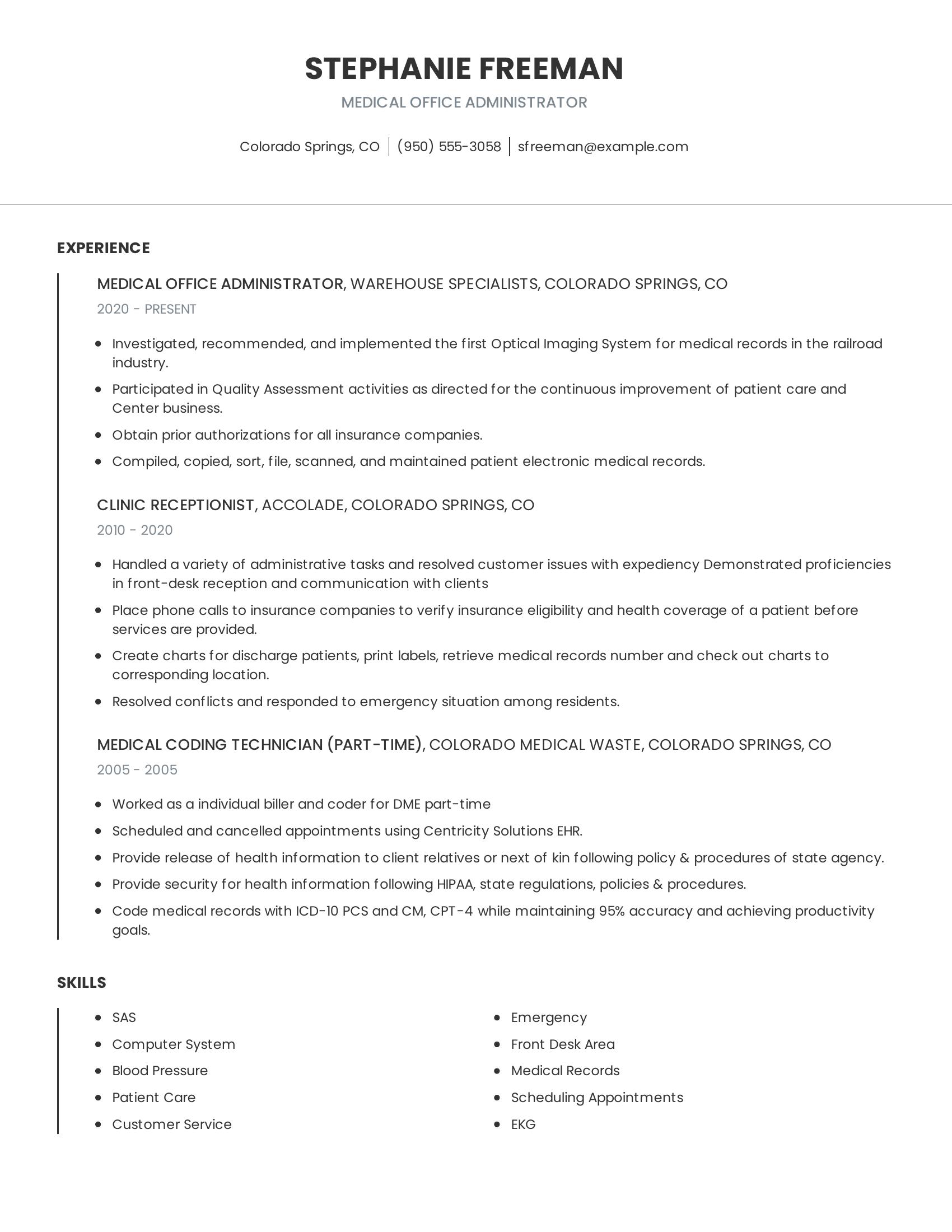
Medical billing clerk resumes should focus on relevant work experience, highlighting skills in billing, invoicing, and customer service. They should show familiarity with medical records, insurance processes, and compliance regulations. It is important to showcase hands-on experience in medical environments and the ability to collaborate with healthcare professionals.
This resume effectively includes these specifics by listing detailed work experience in billing and medical environments. The candidate shows their ability to handle invoicing, customer interactions, and compliance tasks. They also highlight previous roles in patient care and financial planning, demonstrating versatility and a broad skill set.
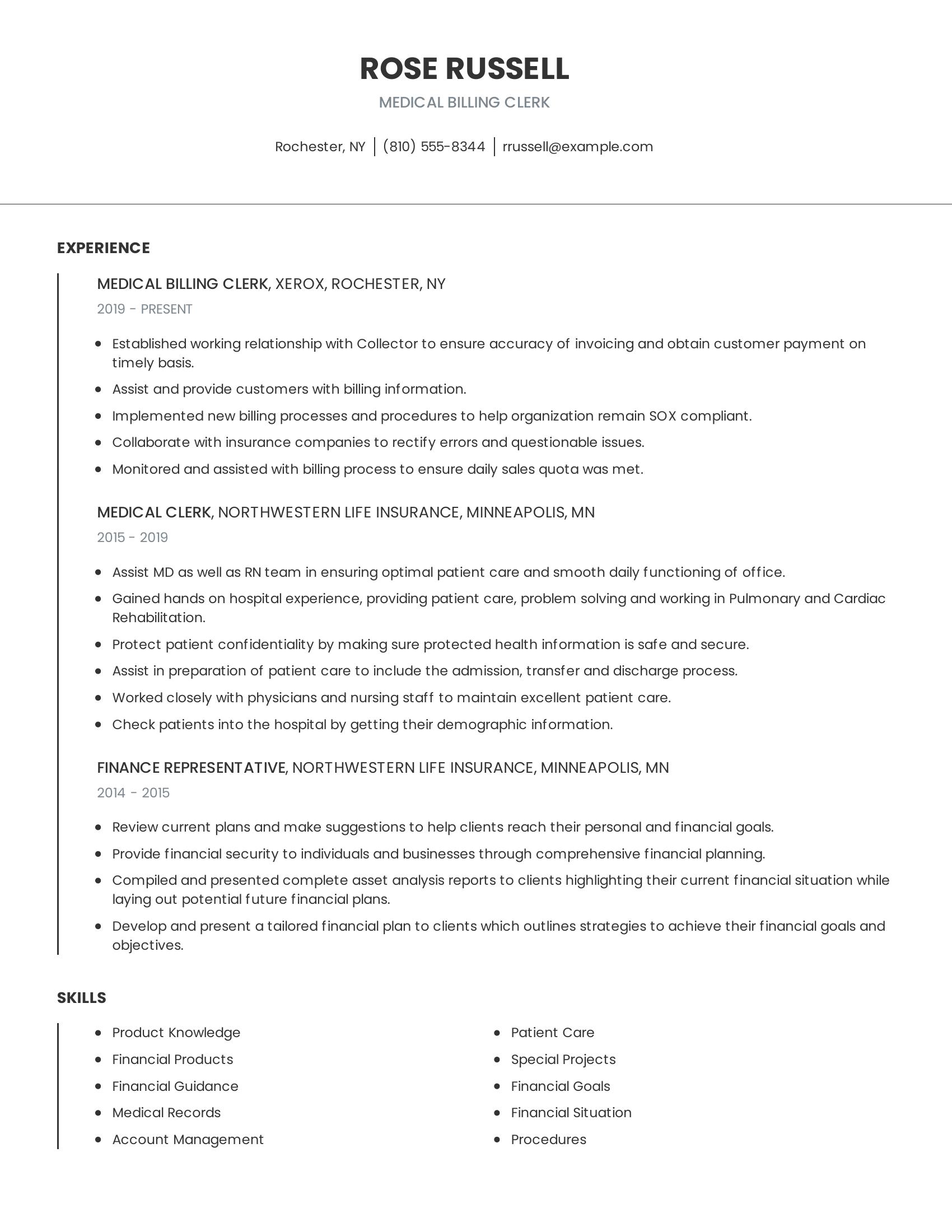
A front office clerk resume should highlight relevant experience in customer service, administrative tasks, and financial transactions. It should include a clear work history with job titles, dates, and duties performed. Important skills like handling phone calls, managing patient accounts, and performing clerical support should be listed. The resume should also showcase the ability to follow company policies and procedures and demonstrate proficiency in using office equipment and software.
This resume includes specific job titles with dates, showing a clear career progression. It details tasks such as preparing bank deposits, ringing up customers at POS, answering phones, scheduling appointments, and providing customer service. The skills section lists relevant abilities like handling phone calls and managing patient accounts, which are vital for a front office clerk role. This concise presentation of experience and skills makes it easy to see the candidate's qualifications.
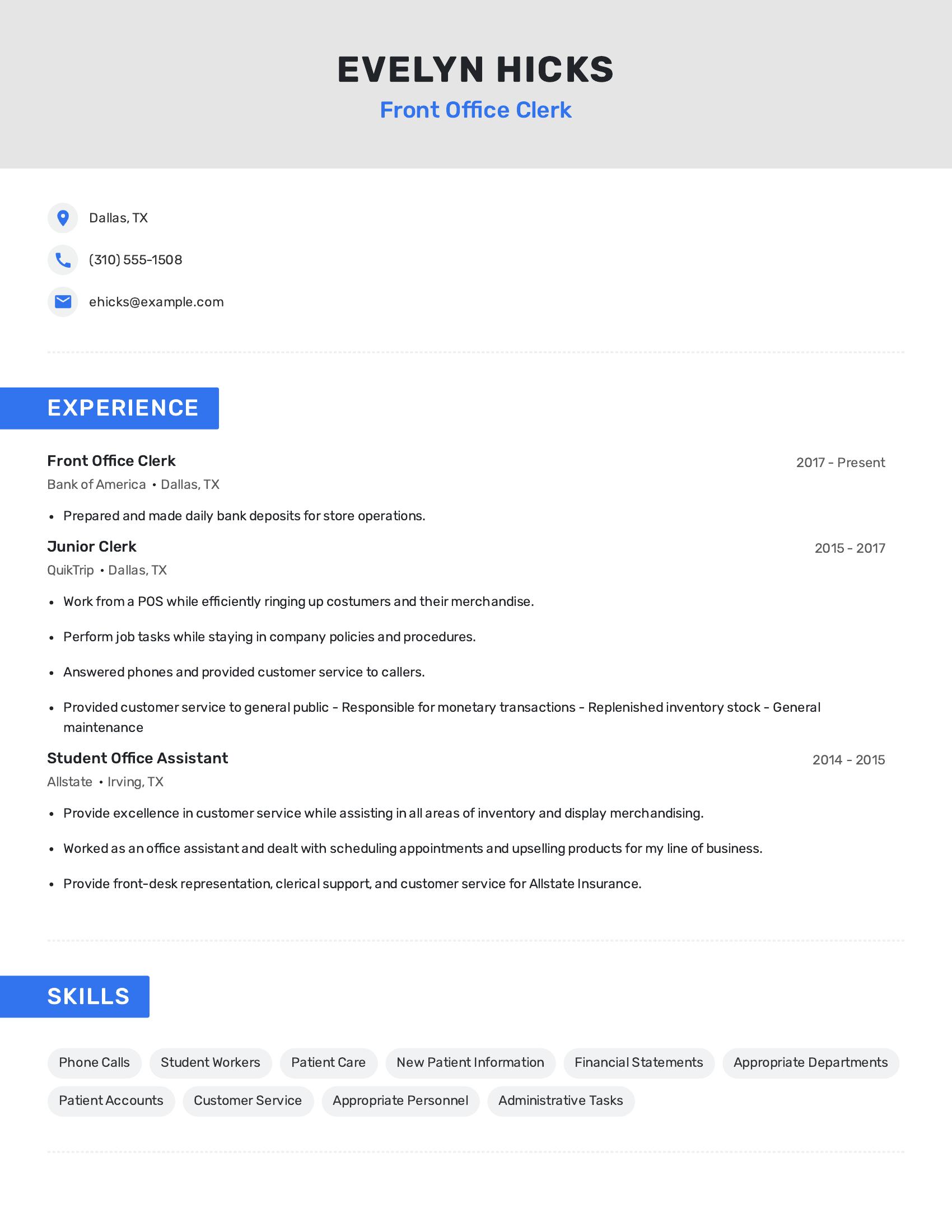
An information clerk cashier resume should highlight work experience, relevant skills, and education. It should include job titles, places of employment, and dates of tenure. The resume must showcase responsibilities and achievements that are relevant to the position. Important skills such as customer service, cash handling, and proficiency with point-of-sale systems should be clearly stated. Contact information should be easy to find.
This resume includes the necessary details for an information clerk cashier position. It lists specific job experiences at Vons and McDonald's with clear dates. Skills in customer service, cash handling, and POS systems are mentioned. The resume also includes a high school diploma and contact information. This shows the candidate's qualifications effectively despite formatting issues.
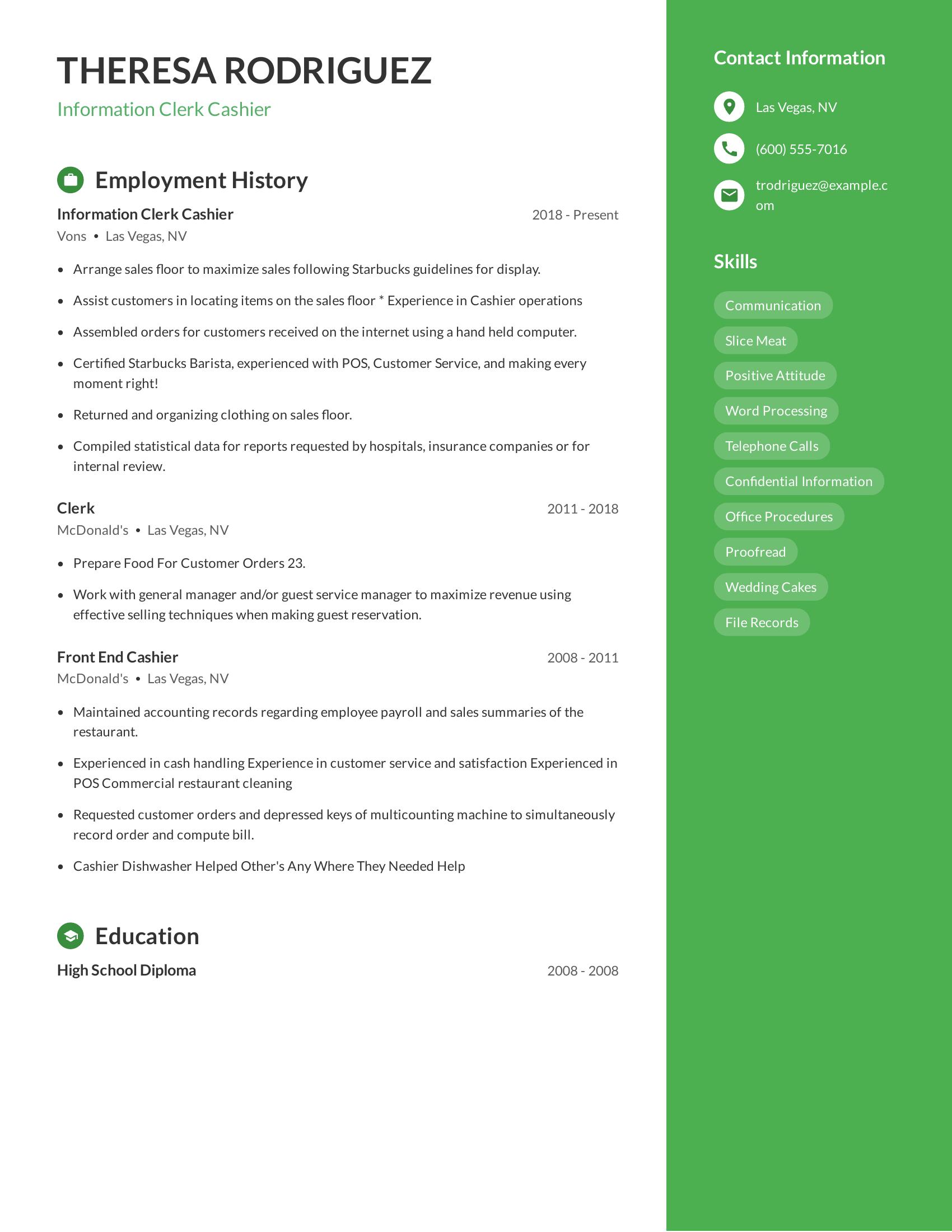
Medical records manager resumes should include specific elements like contact information, a detailed employment history, skills relevant to medical records management, and educational background. Important aspects are the demonstration of leadership, experience in managing medical records, and proficiency with office procedures and technology. These details should be concise and focus on the applicant's achievements and responsibilities in previous roles.
This resume includes all necessary specifics. It lists contact information clearly. The employment history shows progression in relevant roles from office representative to medical records manager. Skills cover important areas like departmental policies and medical records management. Responsibilities and achievements are highlighted, such as reducing physical records significantly and managing a large team. This structure showcases the candidate’s qualifications effectively.
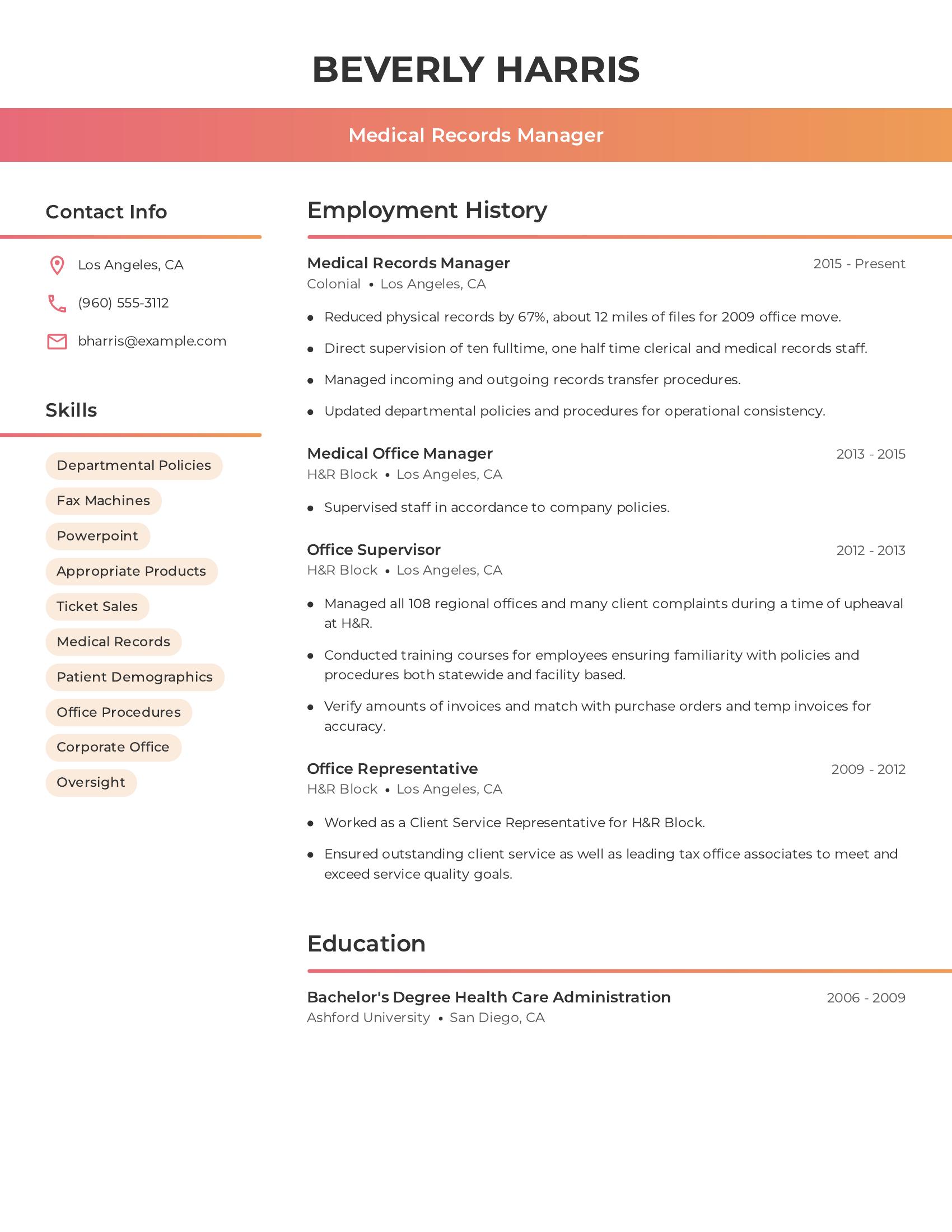
Medical records analyst resumes should highlight experience in managing and analyzing medical records, proficiency in coding systems like ICD-9-CM and CPT, and skills in using electronic health record systems. The resume should detail job responsibilities, such as entering charges for various medical services, managing patient records, and performing quality control. It is important to include any relevant training or implementation of electronic systems, as well as the ability to handle large volumes of records.
This resume includes specific job duties such as entering charges for labs and hospital visits, assigning ICD-9-CM and CPT codes, and managing thousands of patient records. It highlights the candidate's experience with eClinicalworks and converting paper records to electronic formats. The resume also mentions training and mentoring a team to increase productivity, which showcases leadership skills. Additionally, it lists relevant skills like database management and handling legal documents.
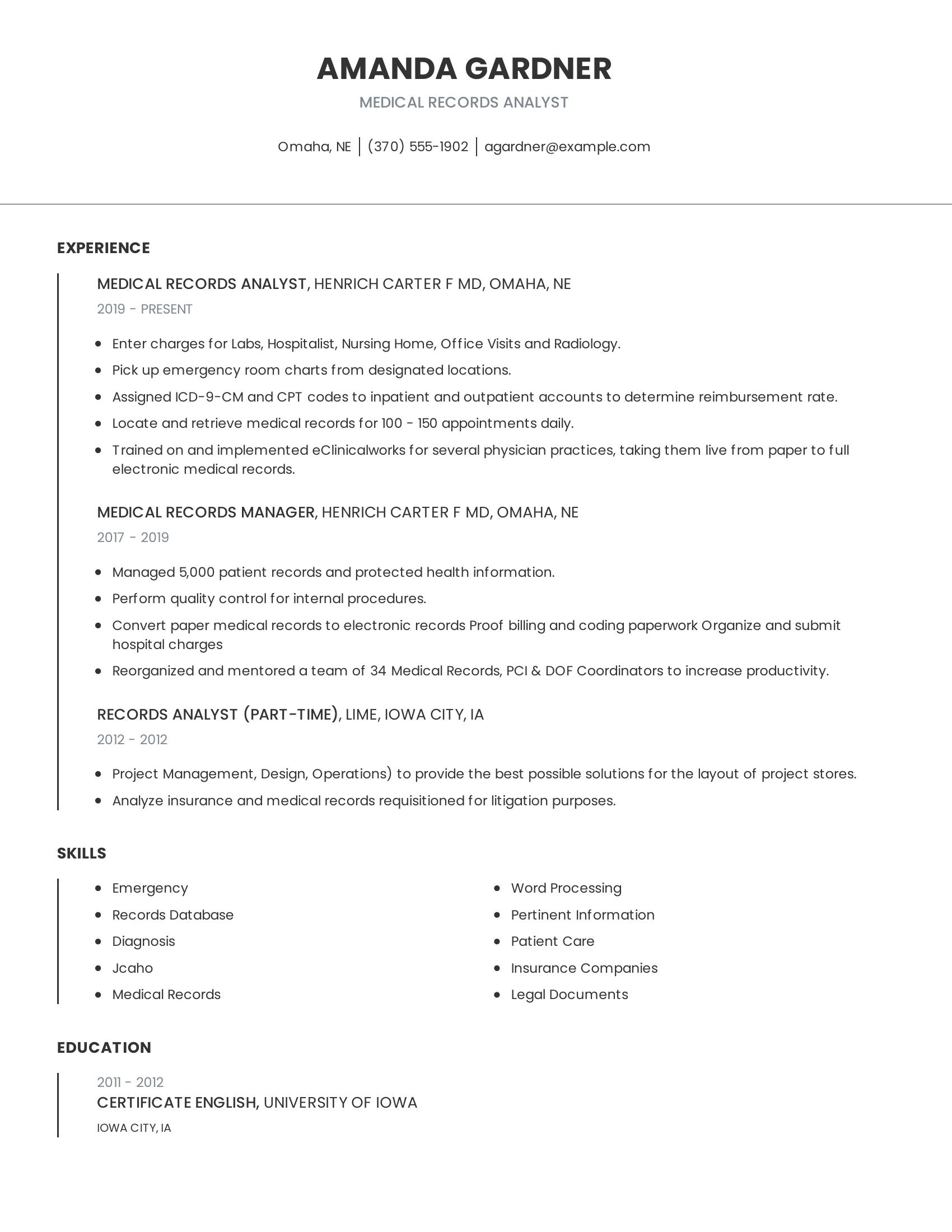
Admissions clerk resumes should highlight relevant experience, technical skills, and interpersonal abilities. They typically include sections on contact information, skills, employment history, and education. Important skills might involve customer service, handling insurance forms, and using medical software. Employment history should show a progression in roles within the admissions or medical field. Education should reflect necessary qualifications like a high school diploma or higher.
This resume effectively includes the essential elements of a good admissions clerk resume. It lists clear contact information and relevant skills like customer service and billing information. The employment history shows experience in similar roles, indicating a strong background in admissions work. The education section confirms the candidate's qualifications. Overall, it provides a comprehensive view of the candidate's suitability for the job.
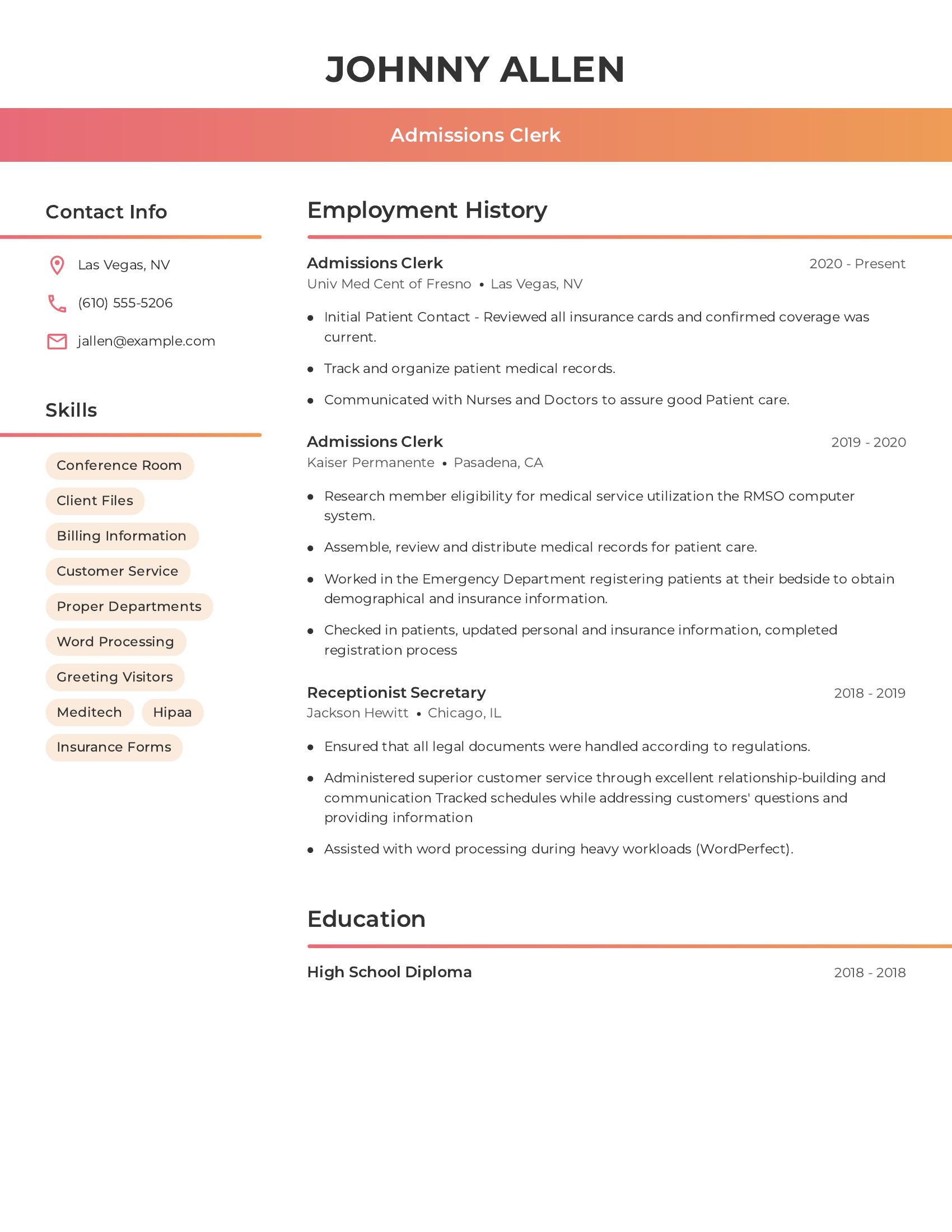
Medical scheduler resumes should highlight experience in scheduling appointments, managing patient information, and coordinating with healthcare professionals. Strong communication skills, proficiency with medical software, and knowledge of insurance processes are important. The resume should also show experience in handling patient confidentiality and administrative tasks.
This resume includes relevant experience in scheduling appointments, verifying insurance coverage, and assisting patients. It demonstrates communication skills and collaboration with healthcare professionals. The candidate's history shows a progression from a medical office administrator to a medical scheduler, indicating growth in relevant skills and responsibilities.
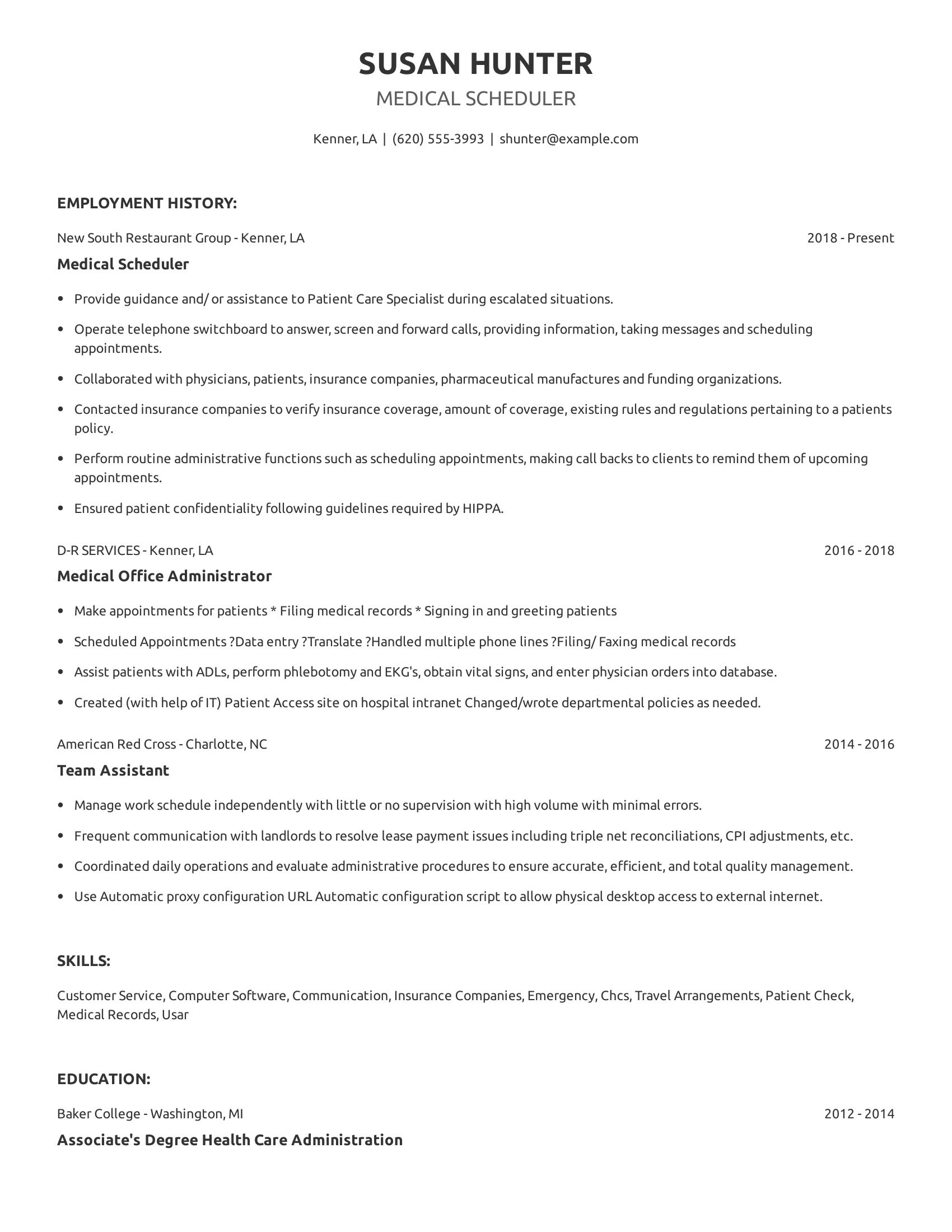
Correspondence clerk resumes should highlight experience in managing communications, handling customer inquiries, and maintaining accurate records. They should showcase skills in office equipment operation, data indexing, and transaction processing. Good resumes list relevant job experiences, specific tasks performed, and skills that demonstrate proficiency in the role.
This resume includes relevant experience from various roles such as correspondence clerk, information clerk cashier, and office assistant. It details tasks like verifying coding, submitting claims, operating office equipment, and handling customer service. The resume also lists skills like communication, customer transactions, and medical records management. This shows a well-rounded background suitable for a correspondence clerk position.
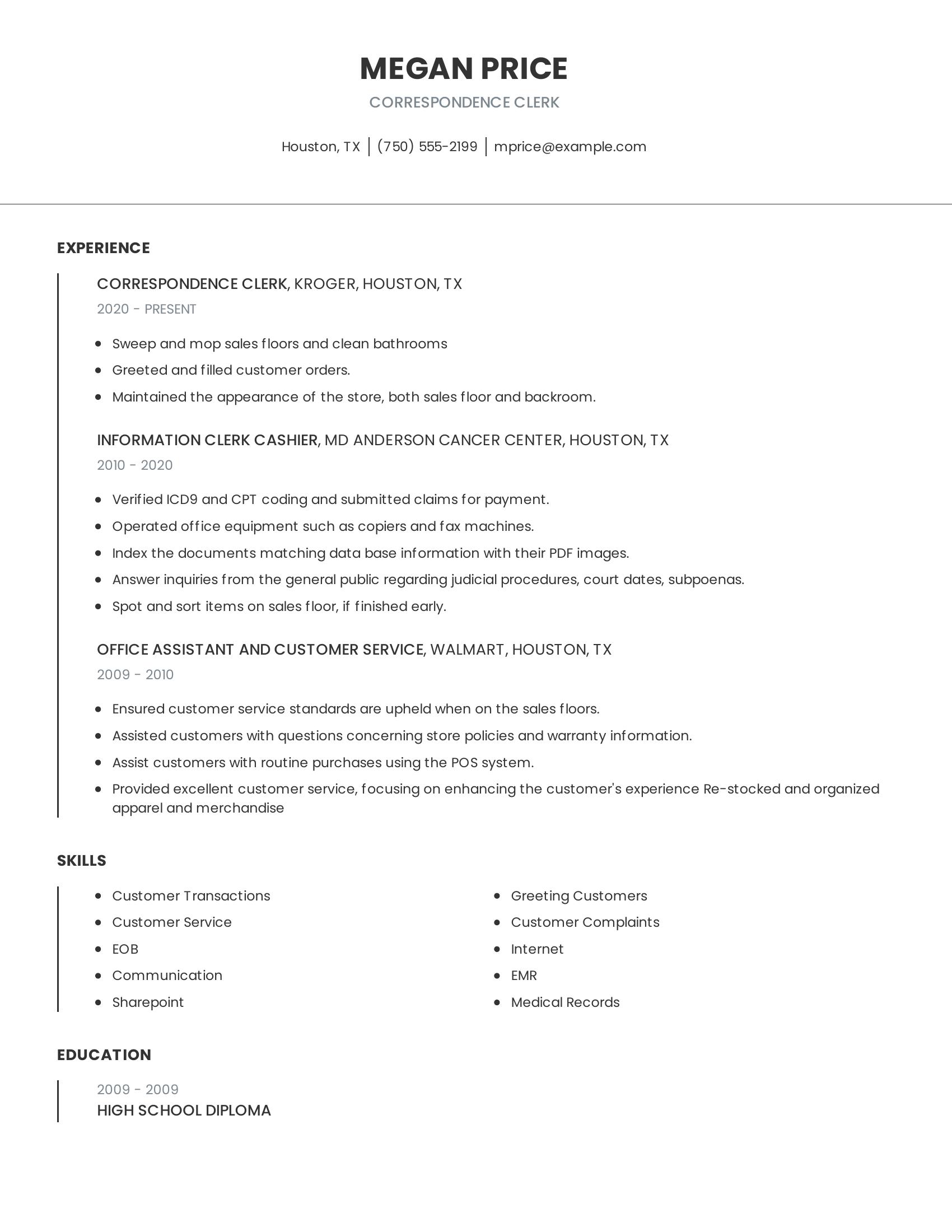
Records custodian resumes should highlight experience in managing and retrieving records, knowledge of compliance standards like HIPAA, and proficiency with electronic medical record (EMR) systems. Skills in maintaining patient confidentiality and handling patient data are crucial. Additionally, showcasing relevant employment history and specific tasks undertaken helps provide a complete picture of the candidate's capabilities.
This resume includes the necessary details by listing positions held, such as records custodian and medical receptionist, along with specific tasks performed like retrieving patient charts and ensuring compliance with HIPAA standards. It also highlights key skills such as patient confidentiality and proficiency with electronic files. The employment history is detailed and shows a progression in responsibilities over time.
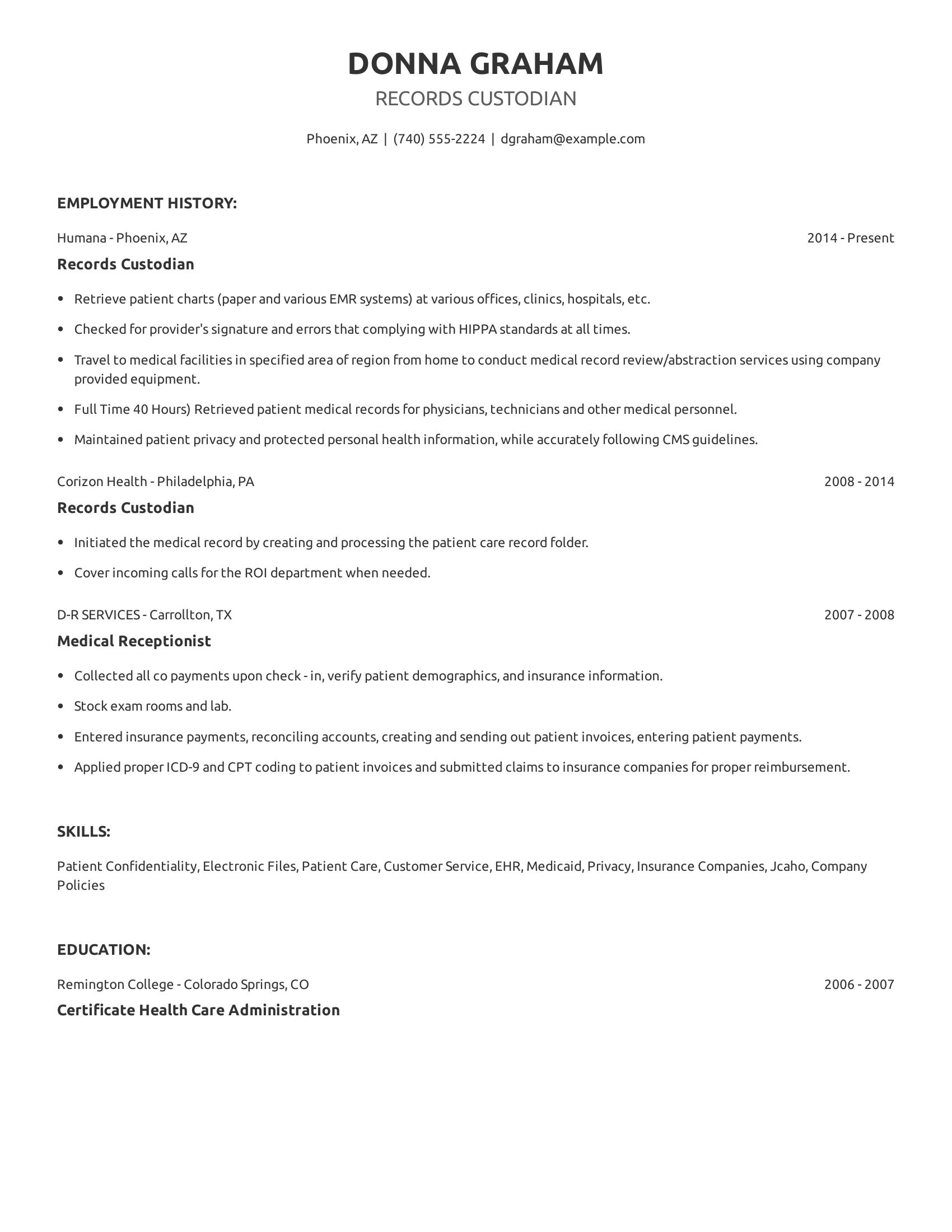
Highlight computer skills. List specific software you have used like Electronic Health Records (EHR) systems, Microsoft Office, or database management tools.
Mention organizational abilities. Describe how you manage patient records, file documents, or handle data entry accurately.
Show attention to confidentiality. Note your experience with HIPAA regulations and handling sensitive patient information responsibly.
A medical records clerk's resume should focus on contact information, a brief summary, work experience, education, skills, and certifications. Highlight past roles related to record-keeping and data management. Emphasize skills like organization, attention to detail, and knowledge of health information systems. Include any relevant certifications and training.
A well-written medical records clerk summary focuses on relevant skills and experience. Mention years of experience, types of medical records handled, and any specific systems used.
Keep the summary brief and to the point. Tailor it to the job you are applying for and use keywords from the job description. Avoid vague statements and focus on specific achievements.
Highlight tasks and duties related to managing patient records and information. Use action verbs to describe your responsibilities. Be specific about the software and technologies you used.
Focus on quantifiable achievements. Highlight your ability to work with sensitive information. Show that you can handle multiple tasks efficiently.
A medical records clerk needs specific hard skills to handle records effectively.
A medical records clerk needs soft skills to interact well with others and manage tasks.